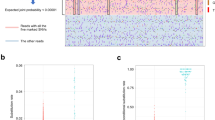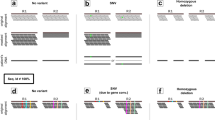Abstract
Our variant ascertainment algorithm, VAAL, uses massively parallel DNA sequence data to identify differences between bacterial genomes with high sensitivity and specificity. VAAL detected ∼98% of differences (including large insertion-deletions) between pairs of strains from three species while calling no false positives. VAAL also pinpointed a single mutation between Vibrio cholerae genomes, identifying an antibiotic's site of action by identifying sequence differences between drug-sensitive strains and drug-resistant derivatives.
This is a preview of subscription content, access via your institution
Access options
Subscribe to this journal
Receive 12 print issues and online access
$259.00 per year
only $21.58 per issue
Buy this article
- Purchase on Springer Link
- Instant access to full article PDF
Prices may be subject to local taxes which are calculated during checkout
Similar content being viewed by others
References
Alm, R.A. et al. Nature 397, 176–180 (1999).
Read, T.D. et al. Science 296, 2028–2033 (2002).
Albert, T.J. et al. Nat. Methods 2, 951–953 (2005).
Shendure, J. et al. Science 309, 1728–1732 (2005).
Service, R.F. Science 311, 1544–1546 (2006).
Harris, T.D. et al. Science 320, 106–109 (2008).
Bentley, D.R. et al. Nature 456, 53–59 (2008).
Andries, K. et al. Science 307, 223–227 (2005).
Velicer, G.J. et al. Proc. Natl. Acad. Sci. USA 103, 8107–8112 (2006).
Hillier, L.W. et al. Nat. Methods 5, 183–188 (2008).
Brockman, W. et al. Genome Res. 18, 763–770 (2008).
Holt, K.E. et al. Nat. Genet. 40, 987–993 (2008).
Li, H., Ruan, J. & Durbin, R. Genome Res. 18, 1851–1858 (2008).
Pevzner, P.A., Tang, H. & Waterman, M.S. Proc. Natl. Acad. Sci. USA 98, 9748–9753 (2001).
Butler, J. et al. Genome Res. 18, 810–820 (2008).
Zerbino, D.R. et al. Genome Res. 18, 821–829 (2008).
Acknowledgements
We thank M. Borowsky, S. Young, J. Maguire, B. Cockerham and M. Grabherr for useful feedback during software development, I. Shlyakhter for providing computational infrastructure, T. Shea for validating tuberculosis reference differences, members of the Broad Institute Sequencing Platform for data generation, C. Russ for scientific project management, S. Gabriel and M. Zody for helpful comments, and the US National Human Genome Research Institute for support.
Author information
Authors and Affiliations
Corresponding author
Supplementary information
Supplementary Text and Figures
Supplementary Figure 1, Supplementary Tables 1–8, Supplementary Data, Supplementary Methods, Supplementary Results (PDF 554 kb)
Supplementary Software
VAAL source code and manual. (ZIP 836 kb)
Rights and permissions
About this article
Cite this article
Nusbaum, C., Ohsumi, T., Gomez, J. et al. Sensitive, specific polymorphism discovery in bacteria using massively parallel sequencing. Nat Methods 6, 67–69 (2009). https://doi.org/10.1038/nmeth.1286
Received:
Accepted:
Published:
Issue Date:
DOI: https://doi.org/10.1038/nmeth.1286
This article is cited by
-
Phenotypic differentiation of Streptococcus pyogenes populations is induced by recombination-driven gene-specific sweeps
Scientific Reports (2016)
-
Clonal Complex 17 Group B Streptococcus strains causing invasive disease in neonates and adults originate from the same genetic pool
Scientific Reports (2016)
-
Integrated whole-genome sequencing and temporospatial analysis of a continuing Group A Streptococcus epidemic
Emerging Microbes & Infections (2013)
-
Genome sequence comparison of two United States live attenuated vaccines of infectious laryngotracheitis virus (ILTV)
Virus Genes (2012)
-
Site-Specific Mobilization of Vinyl Chloride Respiration Islands by a Mechanism Common in Dehalococcoides
BMC Genomics (2011)



